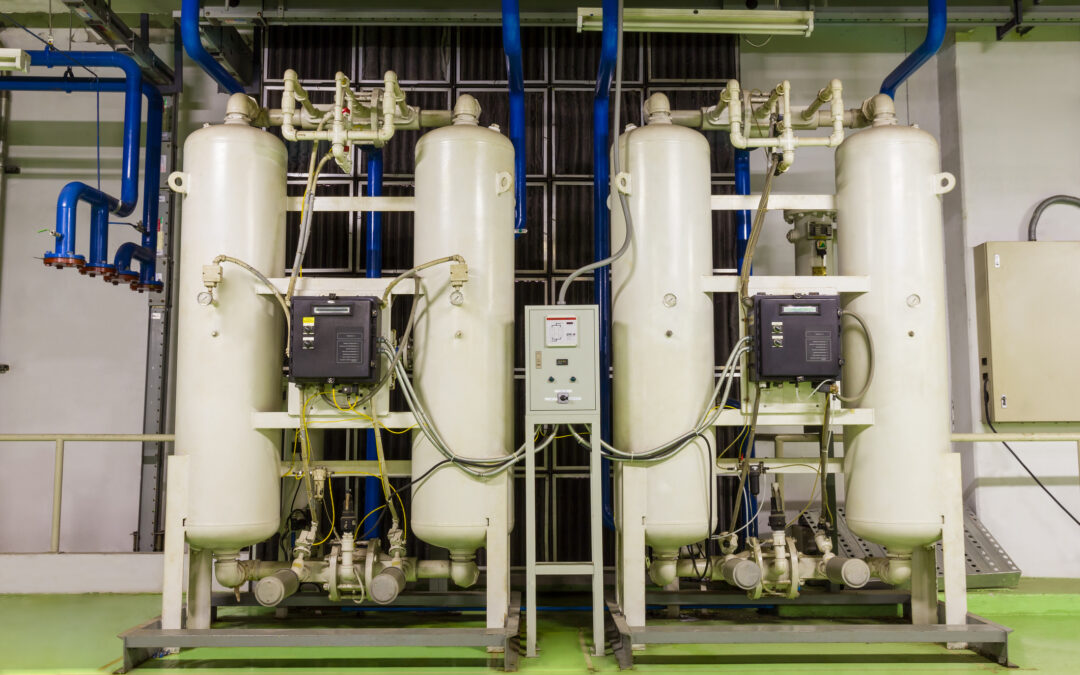Commercial buildings require efficient cooling systems to maintain a comfortable environment for occupants and preserve equipment integrity. Chillers are an essential component of these systems, providing cooling through different mechanisms. So, what are the different chiller types and which is best for your building?
Scroll, Screw, or Centrifugal?
Scroll, screw, and centrifugal chillers are three common types of chillers used for cooling applications. It’s important to note that the specific characteristics and performance of each chiller type can vary depending on the manufacturer and model but here are the main differences between them:
| Scroll Chillers | Screw Chillers | Centrifugal Chillers | |
|---|---|---|---|
| Capacity | Typically for smaller capacities. | Available in a wide range of capacities. | Typically for larger capacities. |
| Efficiency | Known for their good part-load efficiency making them suitable for applications with varying cooling demands. | Known for their high efficiency at full load and are commonly used in large-scale applications where constant cooling demand is required. | Highly efficient at full and part load, offering great energy efficiency in large-scale cooling systems. |
| Maintenance | Have a relatively simple design and require less maintenance compared to other chiller types. | Have more complex designs compared to scroll chillers and their maintenance requirements may be higher. | Generally require more maintenance and specialized expertise for operation and servicing due to their complex design and multiple stages. |
| Noise | Tend to operate quietly compared to other types of chillers. | Generally produces more noise compared to scroll chillers. | Tend to produce more noise compared to scroll and screw chillers, particularly at higher capacities. |
| Operation | Use scroll compressors that have two interleaving scrolls, one stationary and one orbiting, which compress the refrigerant. | Use screw compressors, which consist of two rotating helical screws, that compress the refrigerant as they rotate. | Use centrifugal compressors (typically with multiple stages) that use centrifugal force to compress the refrigerant. |
Scroll Chillers
Scroll chillers utilize scroll compressors that consist of two interleaving spiral-like scrolls to generate cooling. One scroll remains stationary while the other orbits around it. Scroll compressors are known for their high energy efficiency, making them suitable for applications with moderate cooling loads. They are particularly efficient at partial load conditions, making them ideal for buildings with varying cooling requirements.
Scroll chillers are compact and require less space compared to other chiller types. This aspect makes them highly suitable for buildings with limited mechanical room space. Scroll chillers also operate quite quietly, making them suitable for noise-sensitive environments such as office buildings, schools, and healthcare facilities. This is your go-to chill for most small to medium-sized commercial buildings (such as small retail stores or offices) with moderate cooling loads.
Screw Chillers
Screw chillers employ rotary screw compressors to deliver cooling. These compressors use two helical rotors to compress the refrigerant gas and are available in a wide range of capacities, capable of handling larger cooling loads. They are well-suited for commercial buildings with high cooling demands, such as large office complexes and hotels.
While screw chillers are generally less efficient than scroll chillers at partial loads, they excel at full-load conditions. They are preferred for applications where the cooling load remains relatively constant like in a shopping mall or a more industrial facility. Screw chillers are known for their robustness and reliability, making them highly suitable for demanding environments.
Centrifugal Chillers
Centrifugal chillers utilize centrifugal compressors, which use rotating impellers to compress the refrigerant. These compressors can achieve high flow rates and provide efficient and high-capacity cooling, making them suitable for buildings with significant cooling loads. They are commonly used in large industrial and commercial applications where precise temperature control is required.
Centrifugal chillers are highly efficient at full load and at handling varying load conditions effectively. They offer excellent energy savings for buildings with fluctuating cooling demands that need the intersection of high capacity and precise control. Centrifugal chillers are typically larger and require ample space for installation, including mechanical rooms with adequate ventilation, so this is another important building consideration.
Selecting the right chiller for a commercial building depends on various factors like cooling load, space availability, noise restrictions, budget constraints, and energy efficiency requirements. Contact Alliance today so we can determine the most suitable chiller to ensure optimal comfort and cost-effectiveness!

